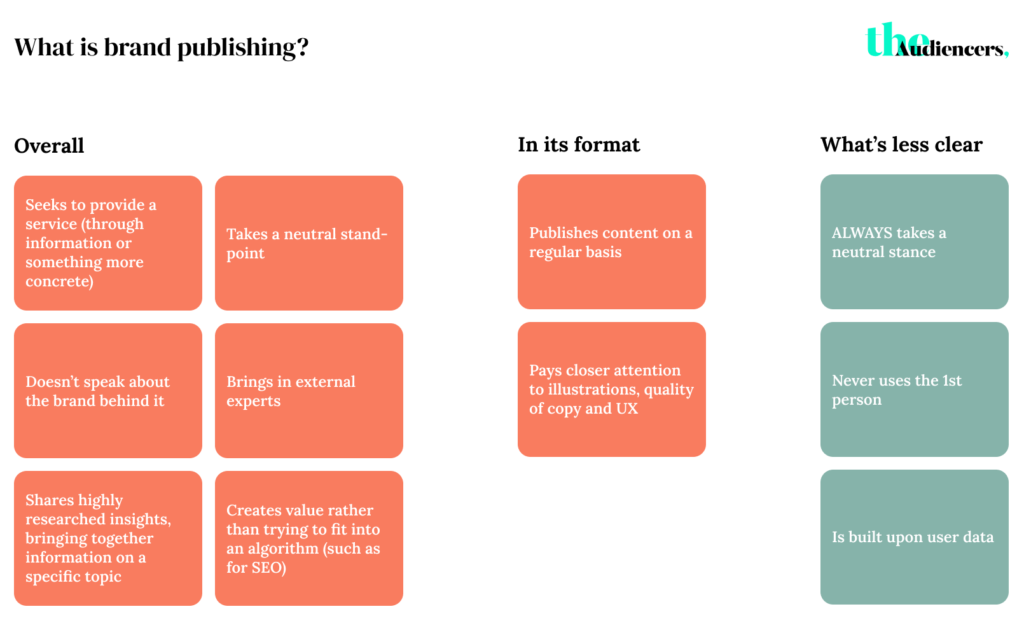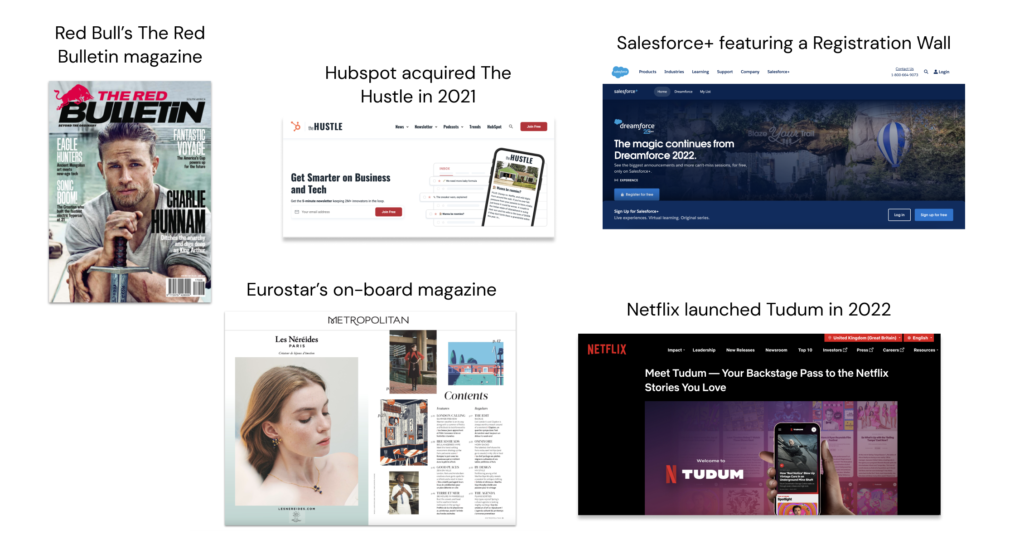

But whilst blogs have long been considered as the optimal content strategy for brands, there’s a new kid on the block and it’s arguably even more valuable to your business…
Brand publishing, and no it’s not simply another name for content marketing. There are actually a huge number of differences between the two.
In terms of the overarching differences, brand publishing…
- Seeks to provide a service (whether that’s information or something more concrete)
- Takes a neutral stance (rather than biased towards the brand, both in terms of content and house style)
- Doesn’t speak about the brand or products (too much)
- Brings in external experts to contribute
- Shares deeper research than a blog
- Creates value for their audience, not simply trying to fit into an algorithm (such as keyword stuffing for SEO)
In its format, brand publishing…
- Produces and publishes content on a more frequent basis and in a variety of formats (for instance written articles, podcasts, newsletters, etc)
- Places a certain amount of importance on the quality of its content, illustrations, page layout, UX, ect
There are, of course, some brand publishing characteristics that are still under debate…
Does a brand publisher ALWAYS have to take a neutral stance?
Does a brand publisher ALWAYS have to avoid using the 1st person?
Should a brand publisher ALWAYS be built from user data?

Content to publish on a company blog:
It’s [insert company name] blog, naturally associated to the product or services, fitting in with the company house style and providing the perfect platform for self-promotional content:
- Case studies and success stories
- Comparing your product to a competitor
- Sharing company updates or insights into life as part of your team
- Client-focussed content on how to use your product
- Reportive content that doesn’t necessarily provide specific advice
- How to solve X problem that, coincidently, your product solves
- White papers
Content to publish on your brand publishing site:
Just like any media, a brand publisher understands, listens to and develops the industry that they’re involved in. This makes it perfect for publishing:
- Content providing advice and expertise to support reader’s daily lives
- Interviews with personalities in the industry
- A community or hub for bringing readers/industry professionals together and potentially inviting them to participate
Brand publishing content likely includes:
- A certain level of content quality, which often means employing dedicated editors that aren’t associated with the brand (even better if they’ve got experience in the publishing industry)
- More illustrations than a blog, providing a better user experience and adding meaning to content
- A neutral position, providing a variety of points of view and having its own house style (separately to the brand)
- And, although there are a variety of types of brand publishers, there’s one thing that’s true of all sites… access to content is free

Free… completely free?
Differently to traditional digital media, a paywall doesn’t really have a place on brand publisher sites (where selling the product or service is the main end-goal). A Registration Wall, however, creates a different kind of value exchange, one where readers provide you with first-party data and register for free on your site in order to access content. Already used by The New York Times, The Independent and plenty of other digital publishers, de-anonymization strategies through registration help turn your content into business through collecting data, increasing ad revenue and, importantly, better understanding your audience to increase engagement and sales.
The question then comes down to which strategy is the best for you?
Blog or media?
Well it’s ultimately about deciding the purpose that you’d like your content to have…
Are you ready to invest in producing exclusive, quality content to influence your industry, naturally collecting leads for your brand through a developed inbound strategy? In other words, are you looking for a clear ROI from your content? If yes, brand publishing with a registration wall on content is the best solution for you.
If, however, you only think of your content as
- A first step in your sales funnel, helping to qualify leads (through case studies, for instance)
- A retention tool to help your clients better use your product (such as “How to” content)
…then a blog is the best strategy for you.












